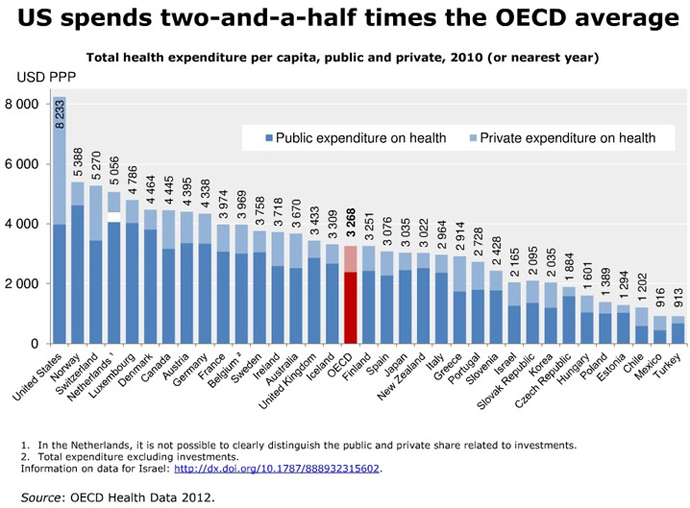No, ObamaCare isn't causing soaring health costs
Soaring spending and soaring costs aren't the same thing

A free daily email with the biggest news stories of the day – and the best features from TheWeek.com
You are now subscribed
Your newsletter sign-up was successful
Megan McArdle over at Bloomberg View is convinced that soaring health-care spending was the difference between the economy growing and it being in recession. She's right on at least one point: Health-care spending really did soar, up 9.9 percent on last year.
(Bureau of Economic Analysis)
There is no doubt that the surge was driven by the Affordable Care Act's coverage expansion. More than 9.5 million extra Americans in total got covered in the rollout — including 6 million who bought private coverage, 2 million of whom were previously uninsured. That's on top of 4.5 million extra enrollees in Medicaid and 3 million extra young adults under the age of 26 now covered by their parents' plan.
The Week
Escape your echo chamber. Get the facts behind the news, plus analysis from multiple perspectives.

Sign up for The Week's Free Newsletters
From our morning news briefing to a weekly Good News Newsletter, get the best of The Week delivered directly to your inbox.
From our morning news briefing to a weekly Good News Newsletter, get the best of The Week delivered directly to your inbox.
More coverage unsurprisingly translated into more health-care spending. We will probably continue to see the booming growth again next quarter for the same reason, especially as the late enrollees from March start receiving coverage.
McArdle sees the soaring spending as a sign of soaring health-care costs, titling her piece "Watch ObamaCare make health-care costs soar" and noting that "last quarter's figures weren't about coverage expansion, because that hadn't kicked in yet. Last quarter's figures were about good old-fashioned increases in spending per beneficiary." She concluded, "After all the speculation that ObamaCare might be bending the cost curve, we now know that so far, it isn't."
Except coverage expansion had kicked in. With the Medicaid expansion and the closure of loopholes that allowed insurance companies to continue to deny the inclusion of those under 26 on their parents' plans having come into effect on January 1, it's totally conceivable that the extra spending was due not to rising costs but to rising coverage. The data on coverage support this view. In the fourth quarter of 2013, 17.1 percent of Americans were uninsured, yet by the first quarter of this year the uninsured rate had fallen to 15.9 percent. That decrease is on top of a further decrease from 18 percent in the third quarter.
Furthermore, the data on health-care prices supports the view that the increased spending was due to increased coverage, not soaring prices. Health-care inflation last month was running at 2.17 percent. That's substantially down from last year, when it was running above 3 percent, and 2012, when it ran above 4 percent. Medical price increases are coming down this year, and that's a fact.
A free daily email with the biggest news stories of the day – and the best features from TheWeek.com
In the long run, we don't know for sure exactly how ObamaCare will change things. But when we look at other countries with systems similar to ObamaCare based on an individual mandate — the closest of which are probably Switzerland and the Netherlands — their health-care costs are considerably lower than America's:

(PBS/OECD)
It is logical to presume — unless data shows otherwise — that by adopting a Swiss-style system, America will be on the road to Swiss-style and Dutch-style health-care costs. That means less price inflation for health care, not more.
John Aziz is the economics and business correspondent at TheWeek.com. He is also an associate editor at Pieria.co.uk. Previously his work has appeared on Business Insider, Zero Hedge, and Noahpinion.